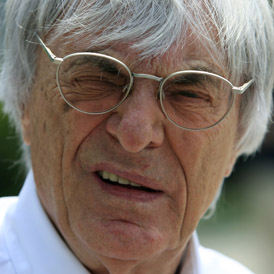Silverstone finds the formula for Grand Prix success
Silverstone – the home of the British Grand Prix – shows off its new £27million pits and paddock complex – as speculation continues over the ownership of Formula One’s worldwide commercial rights.

The stars of Britain’s F1 racing history – from Sir Stirling Moss and Sir Jackie Stewart, through Nigel Mansell and Damon Hill to the 2009 world champion Jenson Button – were in attendance as the Duke of Kent declared open the Silverstone “Wing” – an angular three-storey complex designed by the architects behind the London 2012 Olympic Stadium.
The Wing houses 41 garages, the race control building and podium, hospitality suites, a media centre and a new spectator area. Its development has meant that the start-finish line has been moved to between Club and Abbey corners, which the organisers believe will make for more exciting racing – as well as providing a more state-of-the-art setting.
Damon Hill – a former world champion and president of the British Racing Drivers Club (BRDC) – said it was important for motor-racing in Britain that the development had been completed. “We’ve had people putting up palaces around the world, so it’s fantastic we’ve got this facility now, and it’s kept Britain at the forefront of motor sport around the world,” he added.
“We’ve had people putting up palaces around the world, so it’s fantastic we’ve got this facility now.” Damon Hill
Silverstone has agreed a new 17-year deal to stage the British Grand Prix, but the future ownership of the sport – and its presence on our TV screens – is once again under a cloud.
The commercial rights to F1 are currently in the hands of the private equity firm, CVC Capital Partners, who bought them from Bernie Ecclestone in 2006. But Ecclestone runs the sport on their behalf and remains its public face. What he says goes – and at the moment he is saying that Formula One is not for sale.
But Ecclestone is 80 years old. And the current “Concorde Agreement”, which states that the sport must be broadcast in the UK on a free-to-air channel, runs out next year – which is where Rupert Murdoch comes in.
Takeover negotiations
Murdoch’s New Corporation has said publicly that it is in the early stages of negotiations towards a takeover – and with the BBC’s own contract to screen F1 running out in 2013 – the possiblity of another sport moving over to Sky is a very real one.
One of News Corp’s partners in the F1 bid is reported to be the Italian investment company Exor, which holds a significant investment in Fiat – itself the parent company of Ferrari. And senior executives of Ferrari have been speaking out lately over their unhappiness at the current ownership structure of the sport.
If the News Corp deal does not go through – and there are many in the sport who question whether it is really good business to lose the profile and viewing figures it gets on terrestrial television – there is a third option: that the F1 teams themselves set up a consortium to run the sport.
Ross Brawn, co-owner of the Mercedes F1 team, told Channel 4 News: “We don’t want to limit the audience of Formula One in the future. It has worked very successfully with terrestrial TV and we think that is the model for the future.
“The amount of income that we are getting into Formula One is considerable. What we want to do is perhaps change the ratio a little bit.”
The optimism of today’s launch at Silverstone – and the exciting racing we’ve already seen at the start of the new F1 season – cannot completely mask the air of uncertainty that currently drifts around the world’s pit lanes.